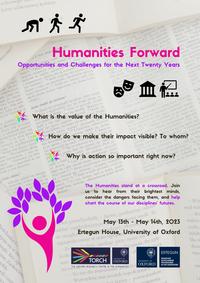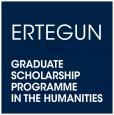Humanities Forward: Opportunities and Challenges for the Next Twenty Years

Whereto the Humanities? What will preoccupy the Humanities scholar as we hurtle towards mid-century at an ever-increasing pace? Beset by institutional hawks demanding more quantitative impact and value, how do the Humanities respond, innovate, and preserve the tangible and intangible affects which make our work worthwhile? This conference invites early career researchers and graduate students—along with other interested stakeholders—to paint our near-future with a critical eye, to debate what the Humanities are going forward, and to tackle the challenges and opportunities researchers are facing in a changing world.
Conference programme: click here to access the full programme
Invited academic respondents: Helen Small, Dan Grimley, Elleke Boehmer, Michele Bianconi, Lynn McAlpine, Gervase Rosser, Emily Troscianko (all Oxford), Arlene Holmes-Henderson (Durham), Paul Lawrence (Open University), Barbara McGillivray (KCL).
Full list of speakers:
Wojciech Sowa and Charles Giry-Deloison (Chair and Vice-Chair of HERA) - Humanities Research Seen from a European Network Perspective
Thomas Nelson (University of Oxford) - Collaboration and Community in the Future of Humanities Research
Stephanie Oade (Oundle School) - Investing in the Young
Sarah Thomas (Independent Scholar) - The Knowledge to Love
Alex Kostova (University of Sofia) - India and the Global Future of the Humanities
Jenny Vo-Phamhi (Columbia University) and Katherine Benjamin (University of Oxford) - Syennesis to Aristotle, 2400 Years on: The Implications of the Machine Learning Revolution in Medicine for the Future of Humanities Research
Jennifer Devereaux (Harvard University), Mohammad Atari (Harvard University), Joseph Dexter (Harvard University), Pramit Chaudhuri (University of Texas at Austin), and Patrick Burns (NYU) - The Future Is Collaborative: Historical Psychology in Latin Texts
Marina Benedetti (President of the Società Italiana di Glottologia), Susan Fitzmaurice (President of the Philological Society), and Daniel Kölligan (President of the Indogermanische Gesellschaft) - The Past, Present, and Future of Historical Linguistics
Frazer MacDiarmid (Te Arawhiti—The Office of Maori Crown Relations, Aotearoa New Zealand) - The Case for Delight in the Humanities: a View from Te Whanganui-a-Tara
Tomás Lally (University of Galway) - Thoughtful Interdisciplinary Thinking – The Future Is Now
Flora Ka Yu Mak (The Chinese University of Hong Kong) - Literature Pedagogy in the Digitalized Classroom: Observations from Hong Kong
Lena Zlock (University of Oxford) - Shiny Things and How to Make Them Work
Conor Brennan (Trinity College Dublin) - Talking About Trees: The Paradox of the Environmental Humanities
Lindsay Nickels (University of Cincinnati) - Towards Reinvigorating Human Inquiry and Critique, and Enervating the Emphasis on ‘Skills’: Transdisciplinary Research as a Mechanism for Demonstrating the Value of the Humanities
Rafael Uribe Neira (Otto-von-Guericke University) and Ronald Forero Álvarez (University of La Sabana) - The Irene Project: Classical Literature for the Promotion of Peace and Reconciliation in the Classroom
***
Some of the issues considered throughout the conference included:
* What is the value of the Humanities? Is there an intrinsic value that allows us to pursue the Humanities for their own sake, and should we foreground such salience? Or, in instrumental terms, what is the role of the Humanities in fostering critical thinking, empathy, deliberation, or a shared notion of culture or the past?
* What can be done to raise the profile of the Humanities? How does one respond to a lack of financial and institutional resources, and to an increasing lack of recognition in strategic aims and targets set out by political and socioeconomic stakeholders? What is the Humanities’ position vis-à-vis the model of the impact-driven, quantitative/bibliometric project? Are there still jobs out there?
* Whose voices represent the Humanities, and to whom do they speak? How do transdisciplinarity and interdisciplinarity embed themselves in the way individual scholars work and are taught? What does the future hold for outreach possibilities, and should public engagement be more central in our work?
* How should the work-life balance of a Humanities researcher be structured? Do REFs, project-specific grants, and administrative bureaucracy stifle innovation and autonomy of research? How do we seriously integrate wellbeing into a stressful job environment, and what do the Humanities have to offer there?
* What innovative changes are the Humanities pursuing and why? What is the importance of open-access publishing and Digital Humanities? Should multi-author papers upend the monograph? How can we emphasize fluid research networks and collaborative work (such as editing a database) rather than stable canons and CVs?
This event was made possible through the generous support of:
- The Ertegun Graduate Scholarship Programme, University of Oxford
- The Oxford Research Centre in the Humanities (TORCH)
Organiser: Stephan Nitu.
Linguistics Special Panel: Michele Bianconi.



